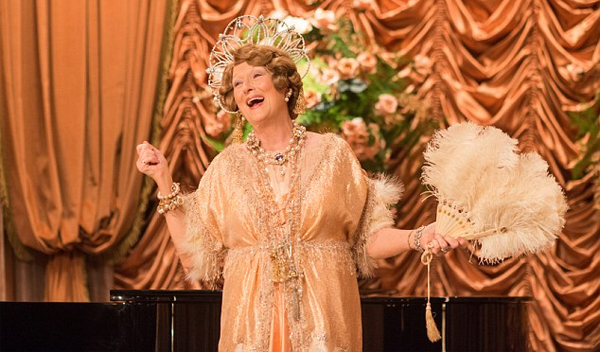Florence Foster Jenkins Review
The only name that matters when it comes to getting butts in front of Florence Foster Jenkins isn’t Florence Foster Jenkins, but rather Meryl Streep.
Improbably, Streep has done what seemingly a dozen Hemsworths couldn’t — become a reliable box office draw based exclusively on star power. She can play a magazine editor, chef, or prime minister, and a certain number of people (generally of a certain age) are going to purchase a ticket to see it.
In her latest, from director Stephen Frears, she’s a bad singer. Yes, millions of people (myself included) paid good money to see Meryl Streep sing badly. Ironically, we paid good money to see her sing surprisingly well just eight years ago in Mamma Mia!, but the world is in a different place. C’est la vie.
Anyway, Florence Foster Jenkins is a wealthy socialite, happily married to esteemed actor and monologist (not really) St Clair Bayfield (Hugh Grant). She loves nothing more than gifting her seemingly endless largess to composers and various individuals and organizations to promote the art of music. Florence thinks it’s music that binds us together, that’s capable of ending the destruction that plagues the world she inhabits (early 1940s New York).
But gifting other performers isn’t everything for Florence; She wants to perform herself. So she and St Clair hire a pianist — Cosmé McMoon (Simon Helberg) — and a world-famous composer to guide Florence through vocal lessons. Sadly for the art form (and particularly for everyone in the room), Florence is a terrible, terrible, terrible singer. Unacceptably bad. Just atrocious.
Those around Florence have shielded this fact from her, and she’s under the impression that she’s on par with some of the world’s finest sopranos. St Clair is particularly guilty of treating Florence with kid gloves, and it’s not the only way he’s deceiving this woman. He also has a lover, Kathleen (Rebecca Ferguson), and together, they’re waiting for Florence to succumb to the syphilis she’s lived with for decades.
This makes St Clair sounds like a monster. On the screen, he’s charming and extremely kind-hearted toward his wife. The film skirts around the moral ramifications of both St Clair’s infidelity — they have “an understanding,” he tells Cosmé — and his white lies about Florence’s singing. In real life, I have no idea what St Clair was like toward Florence in real life, but what we see feels like a Hollywood-ization of a more complicated, possibly darker relationship.
All that said, the film is packed with a number of nice, pleasant relationships. Cosmé is an interesting character. He’s played oddly by Big Bang Theory‘s Simon Helberg, but he’s a sort of therapist to both Florence and St Clair and helps advance their respective character arcs in mostly lovely ways.
The real show, however, is watching Streep just belt out nonsense sounds at the top of her lungs. It’s really quite funny, and Florence keeps upping the ante, which makes St Clair and everyone else around her simply lose their minds. First, it’s lessons. Then a private performance. Eventually, she’s on the radio and getting ready to perform in front of thousands of military men. Between the hilarious performances themselves and St Clair’s Chicken Little-esque way of trying to keep the kingdom from collapsing, Florence Foster Jenkins is a hoot. It’s not setting the world on fire — Stephen Frears phones this one in from a craft perspective — but it’s a very fun time.
















